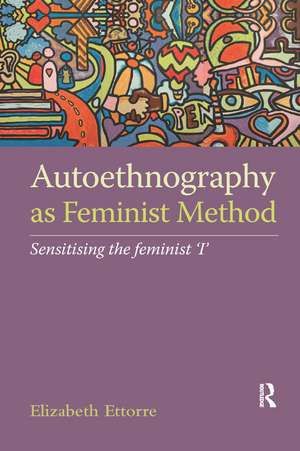Autoethnography as Feminist Method: Sensitising the feminist 'I'
Autor Elizabeth Ettorreen Limba Engleză Paperback – 12 dec 2019
| Toate formatele și edițiile | Preț | Express |
|---|---|---|
| Paperback (1) | 379.09 lei 6-8 săpt. | |
| Taylor & Francis – 12 dec 2019 | 379.09 lei 6-8 săpt. | |
| Hardback (1) | 1106.02 lei 6-8 săpt. | |
| Taylor & Francis – 2 dec 2016 | 1106.02 lei 6-8 săpt. |
Preț: 379.09 lei
Nou
Puncte Express: 569
Preț estimativ în valută:
72.55€ • 75.46$ • 59.89£
72.55€ • 75.46$ • 59.89£
Carte tipărită la comandă
Livrare economică 15-29 aprilie
Preluare comenzi: 021 569.72.76
Specificații
ISBN-13: 9780367877323
ISBN-10: 0367877325
Pagini: 136
Dimensiuni: 156 x 234 x 8 mm
Greutate: 0.2 kg
Ediția:1
Editura: Taylor & Francis
Colecția Routledge
Locul publicării:Oxford, United Kingdom
ISBN-10: 0367877325
Pagini: 136
Dimensiuni: 156 x 234 x 8 mm
Greutate: 0.2 kg
Ediția:1
Editura: Taylor & Francis
Colecția Routledge
Locul publicării:Oxford, United Kingdom
Public țintă
Postgraduate and UndergraduateCuprins
Introduction: Autoethnography as feminist method
1. Being a 'Sexual Pervert' in Academia
2. Finding my Feminist Voice Through an Illness Story: 'An Old Female Body Confronts a Thyroid Problem'
3. Doing Feminist Autoethnography with Drug Using Women
4. "She Wrote it but Look What She Wrote"
5. Sensitizing the Feminist ‘I’
1. Being a 'Sexual Pervert' in Academia
2. Finding my Feminist Voice Through an Illness Story: 'An Old Female Body Confronts a Thyroid Problem'
3. Doing Feminist Autoethnography with Drug Using Women
4. "She Wrote it but Look What She Wrote"
5. Sensitizing the Feminist ‘I’
Notă biografică
Professor Elizabeth Ettorre is an internationally known feminist sociologist. She has written in the areas of substance misuse, genetics, reproduction and autoethnography. Currently, she is Emerita Professor of Sociology, University of Liverpool, Honorary Professor, Aarhuus University, Denmark and University of Plymouth, UK and Docent in Sociology, University of Helsinki and Åbo Akademi University.
Descriere
Autoethnography is an ideal method to study the ‘feminist I’. Through personal stories, the author reflects on how feminists negotiate agency and the effect this has on one's political sensibilities. Speaking about oneself transforms into stories of political responsibility - a key issue for feminists who function as cultural mediators.
